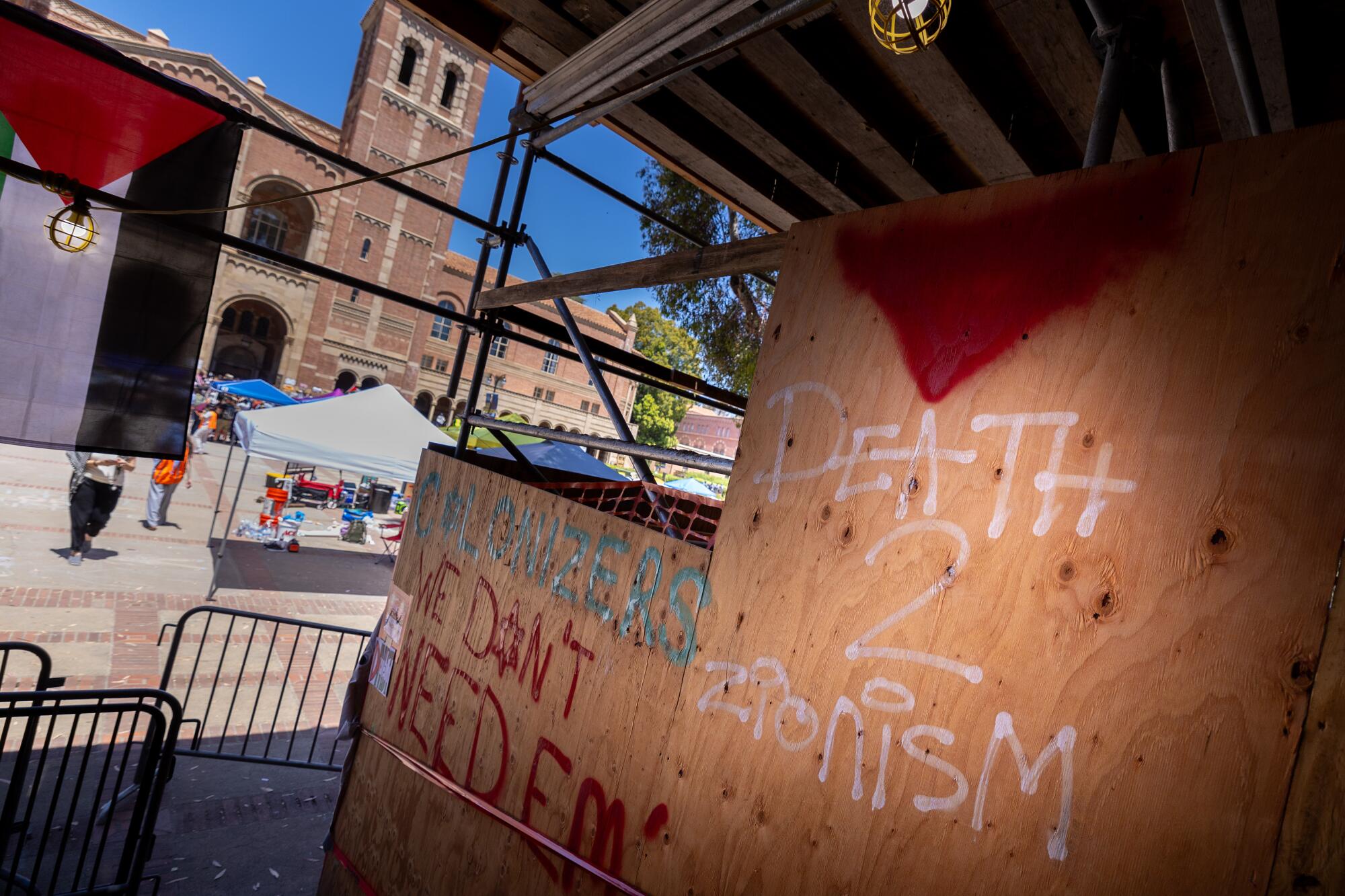
- Share via
Eilon Presman was about 100 feet from the UCLA Palestinian solidarity encampment when he heard the screams: “Zionist! Zionist!”
The 20-year-old junior, who is Israeli, realized the activists were pointing at him.
“Human chain!” they cried.
A line of protesters linked arms and marched toward him, Presman said, blocking him from accessing the heart of UCLA’s campus. Other activists, he said, unfurled kaffiyeh scarves to block his view of the camp.
“Every step back that I took, they took a step forward,” Presman said. “I was just forced to walk away.”
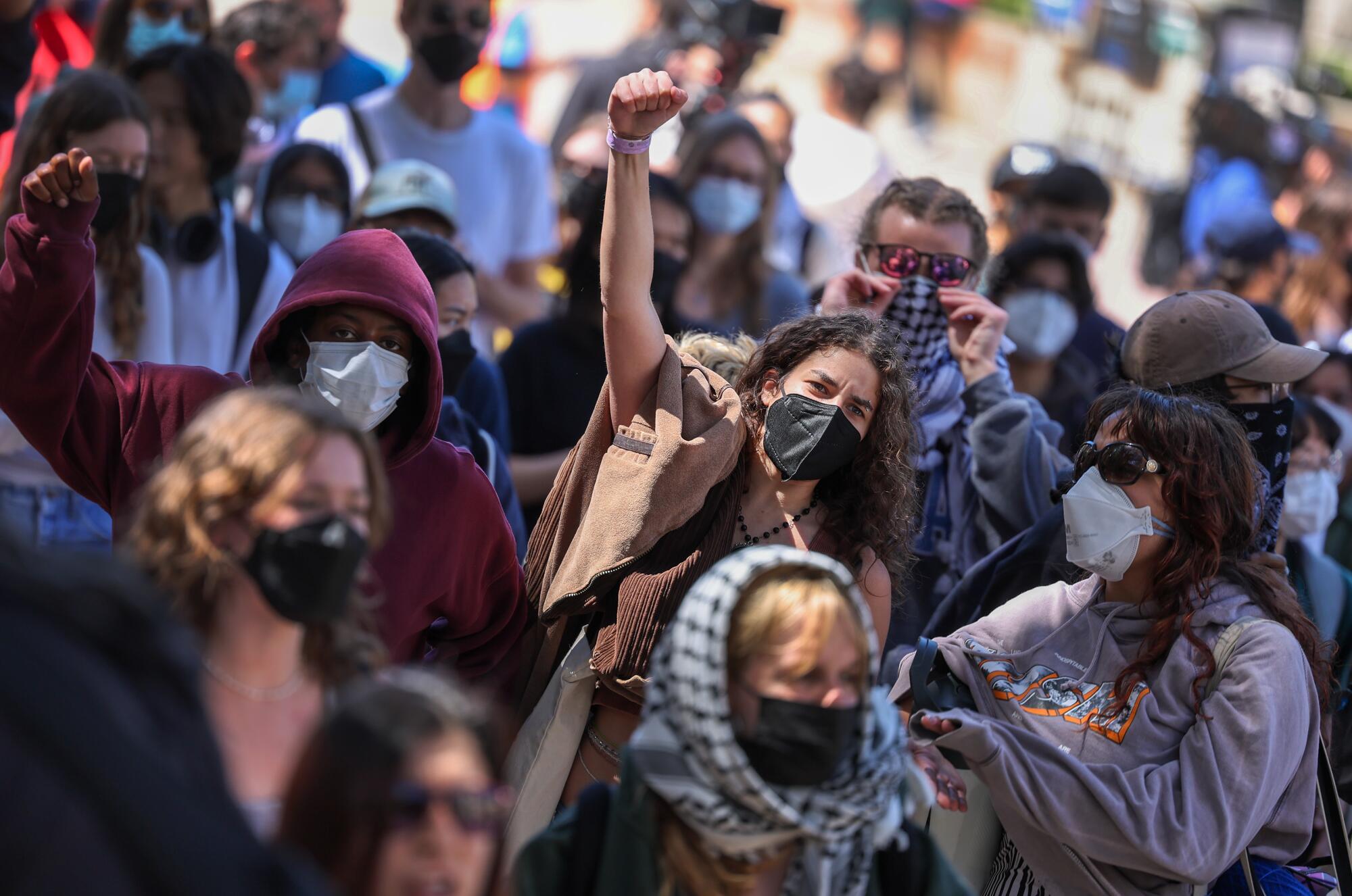
It’s been a week since police swarmed the UCLA campus and tore down the pro-Palestinian camp, arresting more than 200 people. But the legacy of the encampment remains an issue of much debate, particularly among Jewish students, who make up nearly 8% of the university’s 32,000 undergraduates.
In the days leading up to April 30 — when pro-Israel counterprotesters attacked the camp with fists, bats and chemical spray, and police took hours to stop the violence — frustration had swelled among many Jews: Viral videos showed activists restricting the passage of students they targeted as Zionists.
Some Jewish students said they felt intimidated as protesters scrawled graffiti — “Death 2 Zionism” and “Baby Killers” — on campus buildings and blocked access with wooden pallets, plywood, metal barricades and human walls.
The pro-Palestinian student movement includes various strains of activism, including calls for a cease-fire in Gaza, support for Hamas and demands that universities divest from firms doing business with Israel. But on campuses across the country, no word has become more charged than “Zionist.”
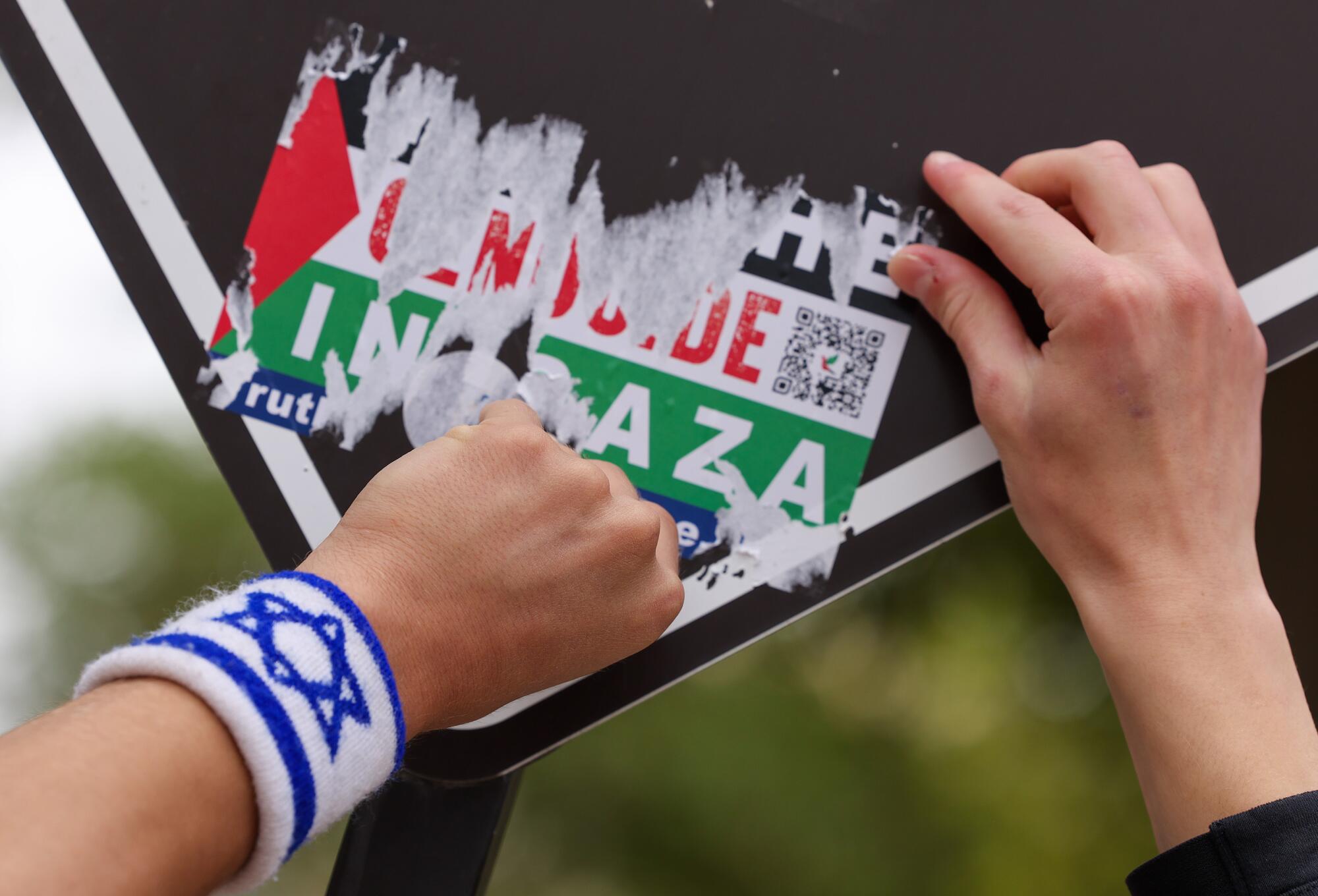
In its most basic definition, a Zionist is somebody who believes that the Jewish people have a right to statehood in their ancestral homeland as a place of refuge from centuries of persecution — in other words, that Israel, established as a Jewish state in the wake of the Holocaust, has a right to exist.
Using that definition, the Anti-Defamation League considers anti-Zionism a form of antisemitism. But protesters — including many Jews — draw a sharp distinction, arguing that it is Zionism that led to a massive displacement of Palestinians seven decades ago and today fuels Israel’s right-wing government and the assault on Gaza that they say amounts to genocide.
Some of the Jewish students who took part in the encampment played a role in excluding Zionists.
Members of Jewish Voice for Peace at UCLA, a small but rapidly growing group on campus, argue they had a moral responsibility to pressure university officials to divest from Israel.
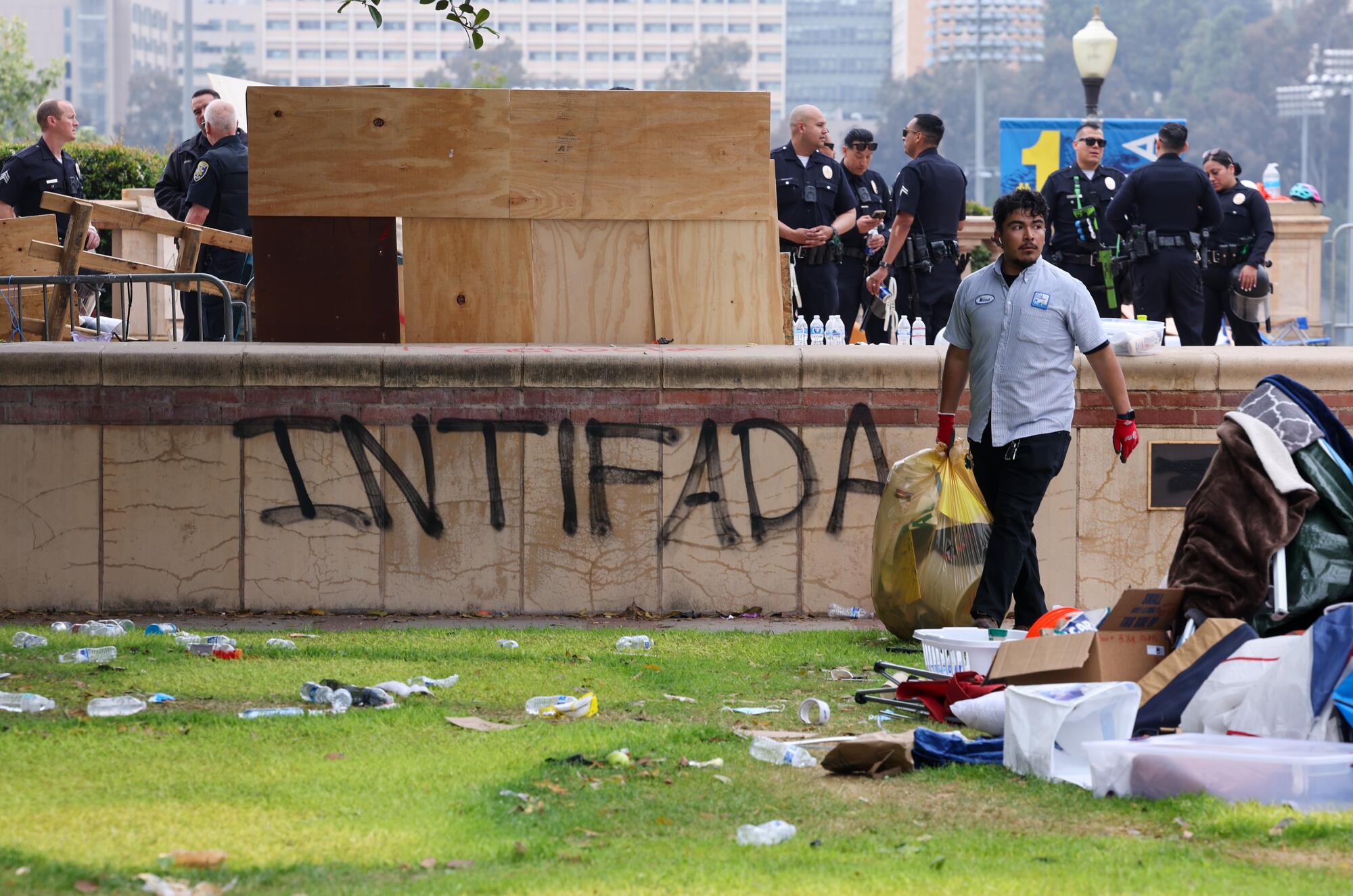
The camp and its checkpoints, they said, were not hostile to Jews. Restricting fellow students from entering was just a pragmatic move to protect protesters inside from physical, verbal or emotional abuse.
“We are committed to keeping each other safe,” said Agnes Lin, 22, a fourth-year art and art history student and member of Jewish Voice for Peace. Anyone who agreed to the UC Divest Coalition’s demands and community guidelines, she said, was welcome.
“What is not welcome is Zionism,” she added. “Or anyone who actively adheres to a very violent, genocidal political ideology that is actively endangering people in Gaza right now.”
In practice, students who supported the existence of Israel were kept out — even if they opposed Israel’s right-wing government and its bombardment of Gaza.
Senior Adam Thaw, 21, said activists blocked him and others from accessing a public walkway to Powell Library.
After telling him they were not letting anyone through, a male activist eyed his Star of David necklace: “If you’re here to espouse that this is antisemitism, then you can leave.”
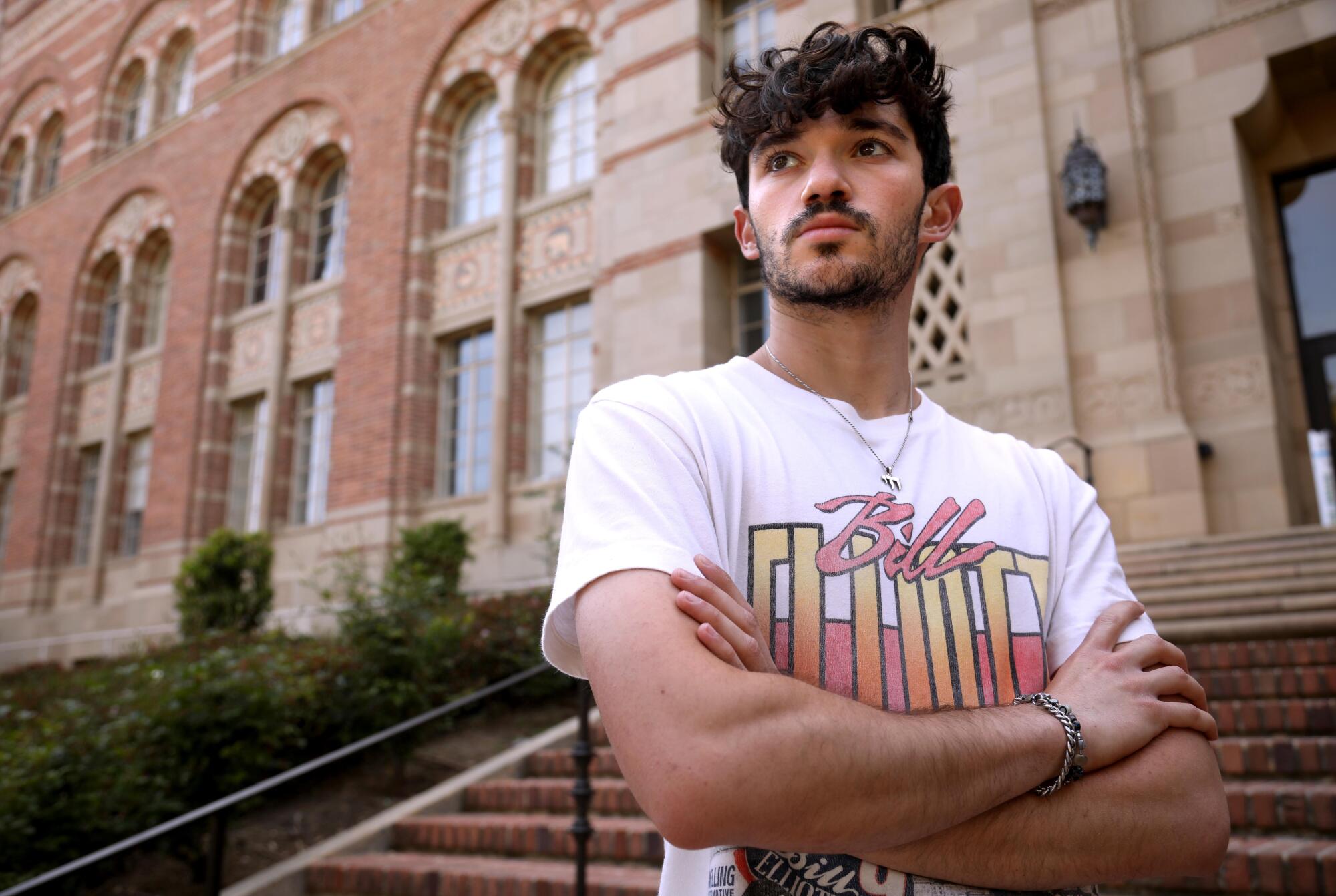
“Who are you to tell me where I can and cannot go?” said Thaw, who is on UCLA’s student board of Hillel, the largest Jewish campus organization in the world.
As complaints from Jewish students mounted, UCLA declared the encampment “unlawful.” In an April 30 statement, Chancellor Gene Block said most activists had been peaceful, but the tactics of some were “shocking and shameful.”
“Students on their way to class,” he said, “have been physically blocked from accessing parts of the campus.”
::
The campus was dark and hushed when Sabrina Ellis joined dozens of activists at 4 a.m. to set up the encampment on the lawn of Dickson Court.
After pitching tents and erecting barricades of wooden pallets and sheets of plywood, Ellis, a 21-year-old international student from Brazil, took shifts guarding the entrance.
Ellis didn’t call it a checkpoint. The goal was to exclude and physically block “agitators” — anyone who might be violent, record students or disagree with the cause.
“Our top priority isn’t people’s freedom of movement,” Ellis said. “It is keeping people in our encampments physically and emotionally safe.”
The longtime member of Jewish Voice for Peace — who wore a large Star of David over her T-shirt and a kaffiyeh wrapped around her shoulders — said the camp “was not profiling based on religion.”
But as activists blocked Zionist students from public campus space, they faced charges that they engaged in viewpoint discrimination.
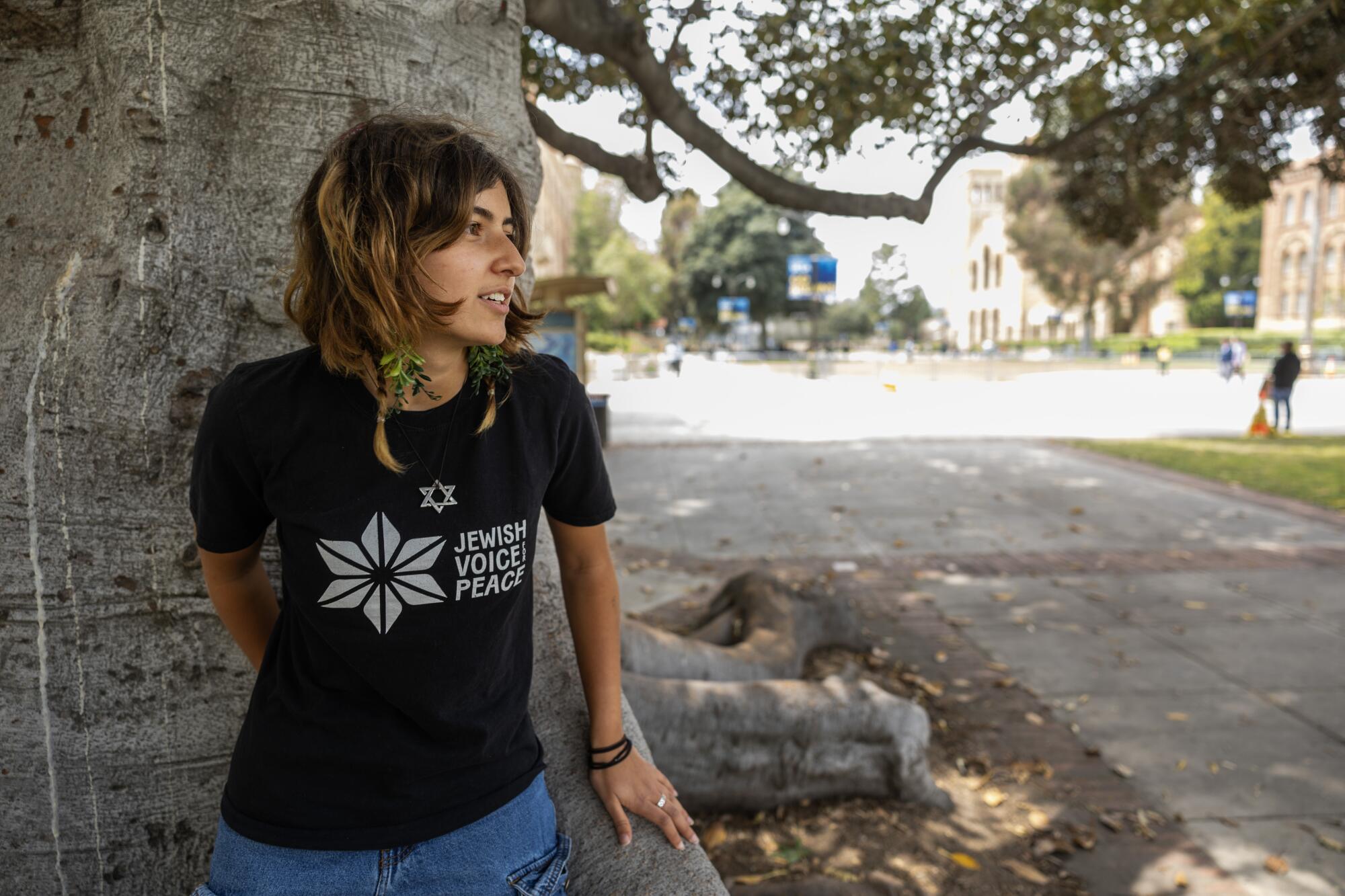
Before allowing anyone in, Ellis said, a protester read the demands of the encampment, which included calling for the University of California and UCLA to divest all funds from companies “complicit in the Israeli occupation,” boycott all connections with Israeli universities, sever ties with the Los Angeles Police Department and demand a permanent cease-fire.
Then, activists ran through their safety guidelines: Ask before taking a photo or video; wear a mask to limit the spread of COVID; do not post identifying information or photos; and no engagement with counterprotesters.
If students didn’t agree, “we would just kindly tell them that they’re not allowed to come in,” Ellis said.
Some Jewish students were shaken by the experience, arriving at Hillel upset and even crying.
“They were genuinely going about their day and couldn’t get access as protesters asked them, ‘Are you a Zionist?’ or looked at their necklace,” said Daniel Gold, executive director of Hillel at UCLA.
::
For pro-Palestinian activists who are Jewish, the camp was a peaceful space to promote justice, a welcoming interfaith community with therapist-led processing circles and candlelit prayer services.
Blue tarps and blankets were put down in the middle of the lawn for Islamic prayers and a Passover Seder and a Shabbat service.
On the first evening, about 100 activists, many Jewish, sat in a circle to pray, sing, drink grape juice and eat matzo ball soup, matzo crackers and watermelon.
“It was really beautiful,” said Lin, the art student. “We were trying to hold these spaces to show that Judaism goes beyond Zionism.”
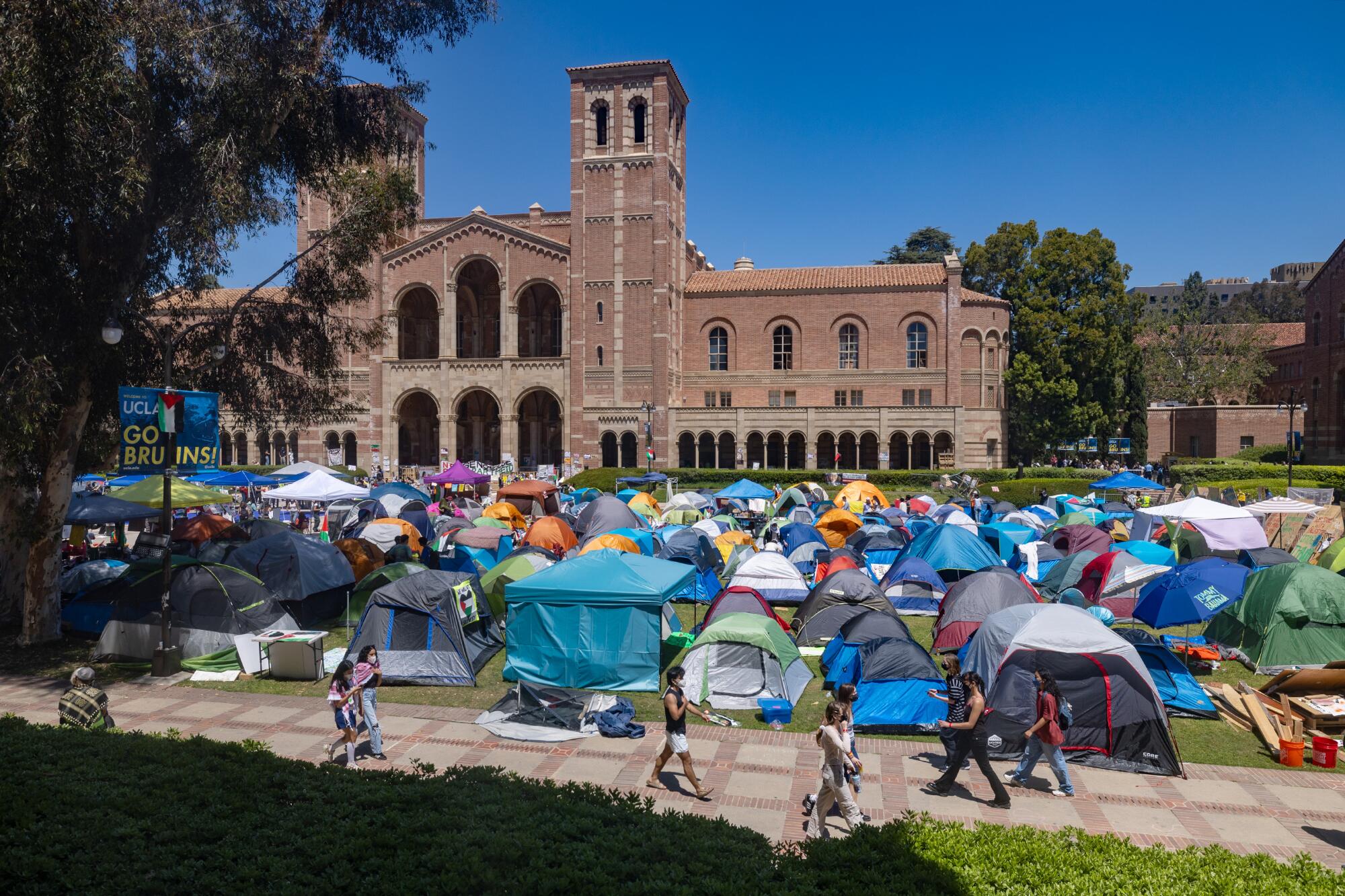
Other Jewish students were more wary as they navigated the camp.
Presman, who moved to the U.S. when he was 12 and identifies as a Zionist, was alarmed when he scanned the quad on the first day. He saw signs saying “Israelis are native 2 HELL,” he said, and banners and graffiti showing inverted red triangles, a symbol used in Hamas propaganda videos to indicate a military target.
“Do people know what that means?” he wondered.
Tucking his Star of David under his T-shirt, Presman said, he entered and approached activists, introducing himself as an Israeli citizen.
“Maybe we can find common ground,” he said, “one human being to the other?”
Some students put their hands up, he said, blocking him as they walked away. Others treated the conversation as a joke. One protester, he said, told him that everything Hamas did was justified.
Presman said he had one good conversation: An activist who identified as anti-Zionist admitted not being 100% educated on what Zionism was, but agreed that Israel should exist. They came to the conclusion the activist was a Zionist.
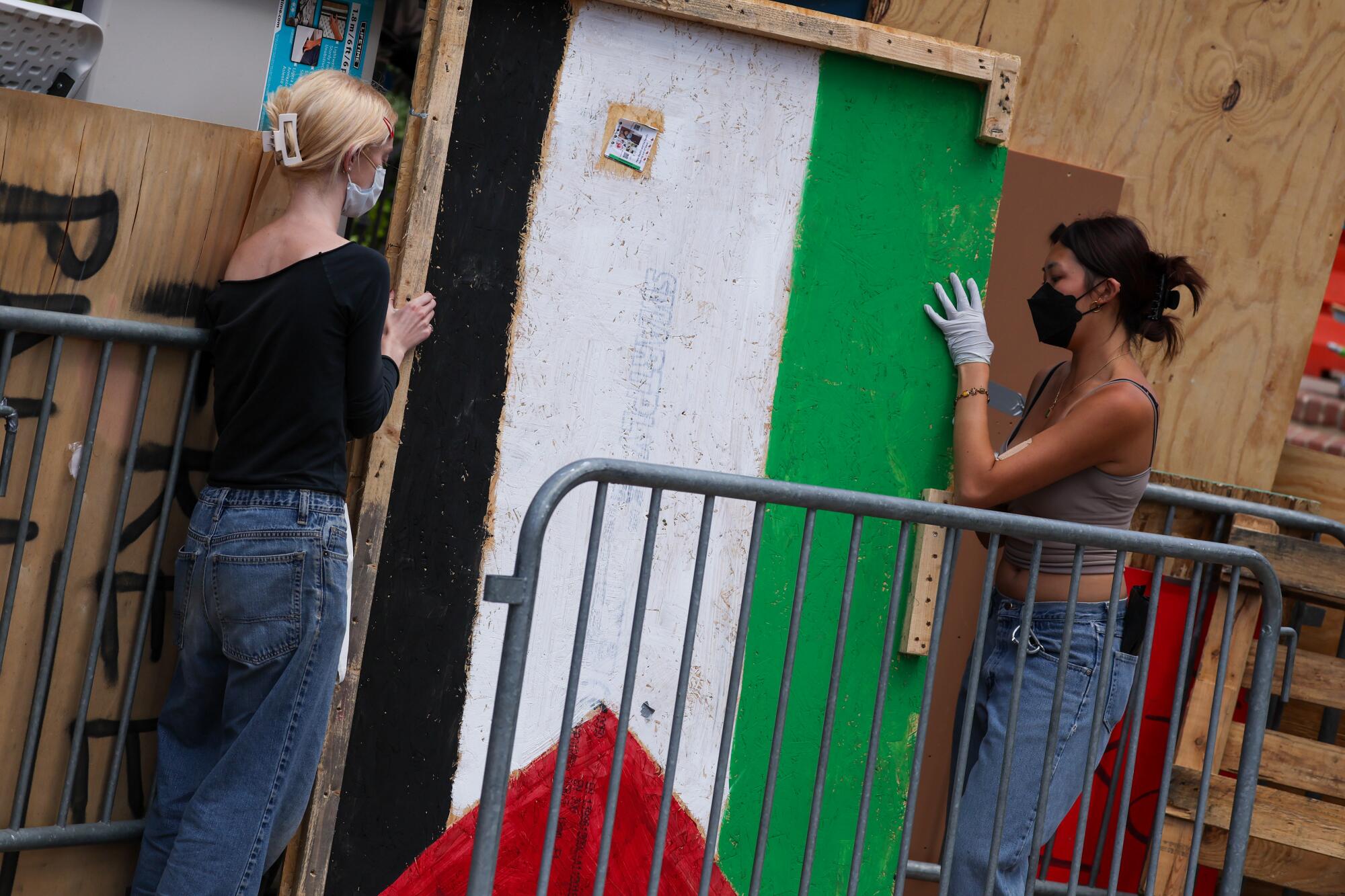
But most of Presman’s exchanges, he said, ended negatively when activists realized he was defending Zionism. He said he was called a “dirty Jew” and “white colonizer.”
Other students — even those who did not fully support the encampment — said they did not experience such slurs.
Rachel Burnett, a senior who described herself as a non-Zionist Jew, disagreed with the call for divestment and academic boycotts, especially of UCLA’s Nazarian Center, an educational center for the study of Israeli history, politics and culture.
Entering the camp after a classmate vouched for her, Burnett was disturbed by anti-Israeli signs and graffiti that named Abu Ubaida, the spokesperson for the military wing of Hamas. But she also bonded with protesters, including a woman in a hijab.
“Of course, some protesters deny Oct. 7 or condone violence as long as it can be put under the guise of decolonial resistance, which is obviously horrific,” Burnett said. “But that’s not the case of many students inside the encampment.”
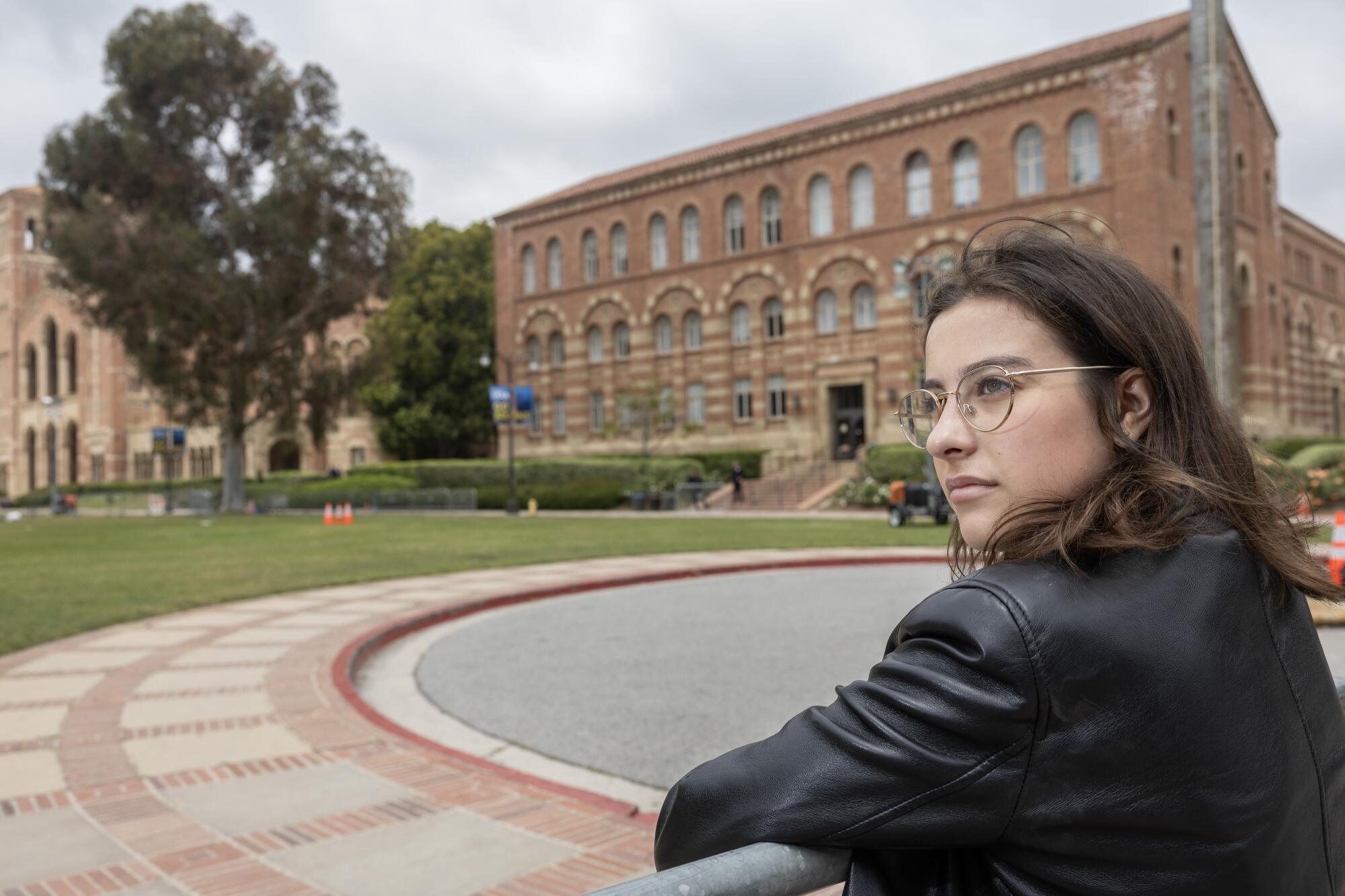
Burnett contrasted what she saw as a peaceful, friendly mood inside the camp with the pro-Israel counterprotests where people held up benign slogans, such as “Bring the Hostages Home,” but engaged in hostile behavior.
As counterprotesters converged for a Sunday rally, she said, a pro-Israel activist spat on her and told her she should have been slaughtered in the kibbutzim on Oct. 7.
Just as some pro-Palestinian activists demonized all Zionists as evil and pro-genocide — ignoring the wide range of viewpoints within the Zionist community — Burnett thought some pro-Israel counterprotesters were dehumanizing student activists in the encampment and spreading a “mass hysteria narrative.”
As the encampment expanded — and organizers set up entrance points near Royce Hall and Powell Library — some Jewish students took videos that swiftly went viral.
“It’s time to go,” a protester wearing a yellow safety vest and kaffiyeh told a student in one video as he guarded an entrance near Powell Library. “You don’t have a wristband.”
A standoff ensued.
“Are you a Zionist?” the protester asked.
“Of course I’m Zionist,” the student replied.
“Yeah, we don’t let Zionists inside.”
More to Read
Sign up for Essential California
The most important California stories and recommendations in your inbox every morning.
You may occasionally receive promotional content from the Los Angeles Times.











